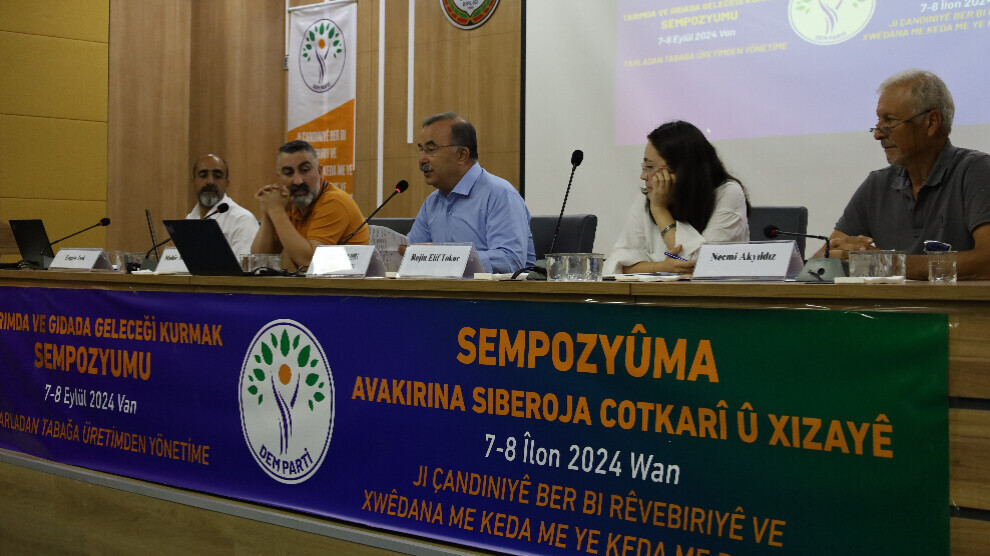Agriculture and Food Symposium in Van on its 2nd day
The ‘Symposium on Building the Future in Agriculture and Food’ organised by DEM Party in Van continues on its second day.
The ‘Symposium on Building the Future in Agriculture and Food’ organised by DEM Party in Van continues on its second day.

The ‘Symposium on Building the Future in Agriculture and Food’ organised by the Peoples' Equality and Democracy Party (DEM Party) in Van as part of the “Bread and Justice Meetings” is on its second day. During the two-day symposium, topics such as ‘Political economy of agriculture’, ‘Agricultural policies in Kurdistan in the context of exploitation policies’, ‘What to do, how to do’, ‘What kind of future in agriculture and food; solution proposals’, ‘Shaping the future of agriculture; advantages and disadvantages’ are being discussed.
Engin Işık, Rojin Elif Tokur, Mahir Mikailoğlu and Necmi Akyıldız made presentations during today’s session moderated by DEM Party MP İbrahim Akın.
In her presentation titled ‘Understanding the dual character of participation: Kavar Cooperative experience’, Academician Rojin Elif Tokur said, “The cooperative was established in 2009 by Özyeğin Foundation with the participation of 5 villages between Tatvan and Van. The handicraft project was the first to be put into practice. All handicrafts made here are sold to the best companies in the world. Later, a greenhouse project was implemented in the village. Women even keep watch in this greenhouse to prevent damage to the products. In the Kavar basin, the bakery project came to life. The beekeeping project started with 3 women and is very successful. When the cooperative was first established, no women were enrolled, but all the work was carried out by women. Finally, 9 out of 35 women were accepted as members of the cooperative. A cooperative requires a holistic process. Since this process does not work, unfortunately, cooperatives do not achieve success.”
In his presentation titled ‘Is it possible to organise the future in agricultural policy?’, Agricultural Engineer Engin Işık stated that agriculture is gradually decreasing year by year: “The budget allocated to agriculture should not fall below 1 percent, but it is currently around 0.6 percent in the country. Again, the population working in agriculture has fallen below 10 percent. Organisation of producers can only increase production. Production can only be possible with organised producers. This is the main way to increase agricultural production. The most important points to increase production and cooperatives are to protect the interests of small enterprises, to increase productivity and quality, to sell the product obtained at its real value, to use resources effectively, to accelerate democratic decision-making processes, to increase the effectiveness of rural areas in the economy, and to make a local organisation.”
Agricultural Engineer Mahir Mikailoğlu, who made a presentation titled ‘The status of cooperatives and world experience’, said: “Cooperatives are based on a model that improves social development. There should be a unity of principles in the establishment of a cooperative. Cooperatives are not only a production process but also a responsibility towards the society. Cooperatives should strengthen the local economy, improve living conditions, give people responsibility and put forward a sustainable model. The most important point here is to increase participation, because if participation increases, the cooperative turns into a family or a small group company. For us, the co-operative is an alternative model. We need to organise cooperatives against the brutality of capitalism. During the 2008 economic crisis that affected the world, cooperatives were the least affected by the crisis. It needs to be a model that will enable women to be less risky in economic activity and more active in the social sphere. A cooperative without women in it has no chance of success.”
Necmi Akyıldız, Founding Member of Ordu Beekeepers Union, made the last presentation of the session with the title ‘The current situation of beekeeping in Turkey: Fight against fake honey and co-operation’ and stated the following:
Currently, 9 million colonies and 120 thousand tonnes of honey are produced in Turkey. While 40 kilos of honey are produced per hive in the world, this rate is 25 kilos in Turkey. In other words, despite all the efforts and labour, the yield is decreasing due to wrong methods. The yield has decreased even more due to forest fires in Turkey. Our biggest problem is fake honey. 90 percent of the honey sold in big markets is fake honey that has never seen a bee. We, the producers, can never cope with these and cannot fight them. These fake honeys are now made by big companies, and they are in a very strong position.”